Deck 2: Early Evolutionary Ideas and Darwins Insight
Question
Question
Question
Question
Question
Question
Question
Question
Question
Question
Question
Question
Question
Question
Question
Question
Question
Question
Question
Question
Question
Question
Question
Question
Question
Question
Question
Question
Question
Question
Question
Question
Question
Question
Question
Question
Question
Question
Question
Question
Question
Question
Question

Unlock Deck
Sign up to unlock the cards in this deck!
Unlock Deck
Unlock Deck
1/43
Play
Full screen (f)
Deck 2: Early Evolutionary Ideas and Darwins Insight
1
Even if philosophers accept and study the importance of change,a full theory of evolution by natural selection cannot exist without
A)understanding the sorts of changes that have taken place.
B)recognizing the significance of testing one's hypotheses.
C)realizing that some species go extinct over time.
D)realizing the vast expanses of time over which some changes take place.
E)B and C
A)understanding the sorts of changes that have taken place.
B)recognizing the significance of testing one's hypotheses.
C)realizing that some species go extinct over time.
D)realizing the vast expanses of time over which some changes take place.
E)B and C
D
2
After Aristotle,one advance in scientific methodology came through the use of logic.This allowed thinkers to
A)formulate and test hypotheses based on evidence.
B)recognize the significance of testing one's hypotheses.
C)move carefully from facts to general principles.
D)B and C
E)All of the above
A)formulate and test hypotheses based on evidence.
B)recognize the significance of testing one's hypotheses.
C)move carefully from facts to general principles.
D)B and C
E)All of the above
C
3
Early Greek philosophers were among the first to
A)develop a philosophy of a natural world driven by physical laws.
B)describe the heavenly bodies as gods or personages.
C)explain the world around them according to fixed laws of nature.
D)A and C
A)develop a philosophy of a natural world driven by physical laws.
B)describe the heavenly bodies as gods or personages.
C)explain the world around them according to fixed laws of nature.
D)A and C
D
4
Lamarck's hypothesis that traits acquired during the lifetime of an individual are passed on to progeny
A)was interesting, reasonable, and based on an idea that was accepted by many scientists and nonscientists alike.
B)connected evolutionary change to environmental fit.
C)All of the above
D)None of the above
A)was interesting, reasonable, and based on an idea that was accepted by many scientists and nonscientists alike.
B)connected evolutionary change to environmental fit.
C)All of the above
D)None of the above

Unlock Deck
Unlock for access to all 43 flashcards in this deck.
Unlock Deck
k this deck
5
To explain how varieties were on the path to becoming new species,Darwin introduced the concept of
A)descent and modification.
C)variational change.
B)transformational change.
D)All of the above
A)descent and modification.
C)variational change.
B)transformational change.
D)All of the above

Unlock Deck
Unlock for access to all 43 flashcards in this deck.
Unlock Deck
k this deck
6
Robert Chambers,a Scottish geologist and author of Vestiges of the Natural History of Creation,is often overlooked for which very important contribution?
A)The theory of the inheritance of acquired characteristics
B)Thinking of evolution in terms of populations not individuals
C)Proposing the enormous influence of the environment on evolutionary change
D)All of the above
A)The theory of the inheritance of acquired characteristics
B)Thinking of evolution in terms of populations not individuals
C)Proposing the enormous influence of the environment on evolutionary change
D)All of the above

Unlock Deck
Unlock for access to all 43 flashcards in this deck.
Unlock Deck
k this deck
7
Two important differences between the processes of natural selection and artificial selection are
A)descent and modification.
B)the selective agent and the traits being selected.
C)the pace of change and the period of time.
D)B and C
A)descent and modification.
B)the selective agent and the traits being selected.
C)the pace of change and the period of time.
D)B and C

Unlock Deck
Unlock for access to all 43 flashcards in this deck.
Unlock Deck
k this deck
8
What were Darwin's two fundamental insights about the process of evolution?
A)The environment selects on variation in the traits of individual organisms; and organisms are in a constant struggle for existence.
B)The environment selects on variation in the traits of individual organisms; and all species have descended from one or a few common ancestors.
C)All species have descended from one or a few common ancestors; and populations, not individuals, evolve over time.
D)Populations, not individuals, evolve over time; and evolutionary change is connected to environmental fit.
A)The environment selects on variation in the traits of individual organisms; and organisms are in a constant struggle for existence.
B)The environment selects on variation in the traits of individual organisms; and all species have descended from one or a few common ancestors.
C)All species have descended from one or a few common ancestors; and populations, not individuals, evolve over time.
D)Populations, not individuals, evolve over time; and evolutionary change is connected to environmental fit.

Unlock Deck
Unlock for access to all 43 flashcards in this deck.
Unlock Deck
k this deck
9
Despite his insights,Erasmus Darwin came up short of a full-blown theory of evolution by natural selection because
A)he failed to connect the struggle for existence to the evolutionary changes that would result from such a struggle.
B)he believed in Lamarck's theory of the inheritance of acquired characteristics.
C)All of the above
D)None of the above
A)he failed to connect the struggle for existence to the evolutionary changes that would result from such a struggle.
B)he believed in Lamarck's theory of the inheritance of acquired characteristics.
C)All of the above
D)None of the above

Unlock Deck
Unlock for access to all 43 flashcards in this deck.
Unlock Deck
k this deck
10
Which of the following concepts was a commonality of early Greek theories?
A)Divine creation
B)Spontaneous generation
C)Uniformitarianism
D)Inheritance of acquired characteristics
E)All of the above
A)Divine creation
B)Spontaneous generation
C)Uniformitarianism
D)Inheritance of acquired characteristics
E)All of the above

Unlock Deck
Unlock for access to all 43 flashcards in this deck.
Unlock Deck
k this deck
11
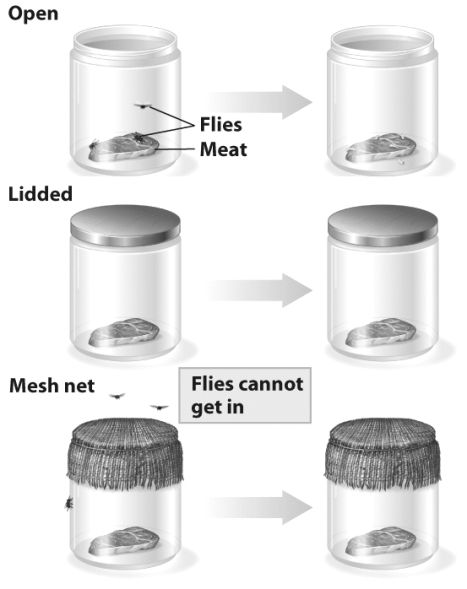 Francesco Redi's experiment,illustrated in the figure above,addressed the question of whether flies spontaneously generated from meat carcasses.Which of the following statements regarding this experiment is (are)true?
Francesco Redi's experiment,illustrated in the figure above,addressed the question of whether flies spontaneously generated from meat carcasses.Which of the following statements regarding this experiment is (are)true?A)Meat in jars with an open lid developed maggots.
B)Meat in lidded jars did not develop maggots.
C)Meat left in jars with mesh covered lids developed maggots.
D)A and B

Unlock Deck
Unlock for access to all 43 flashcards in this deck.
Unlock Deck
k this deck
12
Which of the following examples best illustrates the concept of spontaneous generation?
A)During flooding, frogs spontaneously arise from mud.
B)When a dried bean is moistened and kept moist, it spontaneously transforms into a bean sprout.
C)Some sea anemones spontaneously bud newly developed young from their outer skin.
D)A and B
E)All of the above
A)During flooding, frogs spontaneously arise from mud.
B)When a dried bean is moistened and kept moist, it spontaneously transforms into a bean sprout.
C)Some sea anemones spontaneously bud newly developed young from their outer skin.
D)A and B
E)All of the above

Unlock Deck
Unlock for access to all 43 flashcards in this deck.
Unlock Deck
k this deck
13
Early Greek philosophers failed to exploit one of the greatest advantages of methodological naturalism,which is that explanations can
A)be tested through observation and sometimes manipulation.
B)shift from supernatural to natural.
C)be based on fixed laws of nature.
D)B and C
E)All of the above
A)be tested through observation and sometimes manipulation.
B)shift from supernatural to natural.
C)be based on fixed laws of nature.
D)B and C
E)All of the above

Unlock Deck
Unlock for access to all 43 flashcards in this deck.
Unlock Deck
k this deck
14
Unlike those before him,Aristotle
A)formulated hypotheses without testing them.
B)recognized the significance of testing one's hypotheses.
C)was the first to develop a philosophy of a natural world driven by physical laws.
D)B and C
E)All of the above
A)formulated hypotheses without testing them.
B)recognized the significance of testing one's hypotheses.
C)was the first to develop a philosophy of a natural world driven by physical laws.
D)B and C
E)All of the above

Unlock Deck
Unlock for access to all 43 flashcards in this deck.
Unlock Deck
k this deck
15
Greek philosophers,including Aristotle,developed a keen appreciation for the study of natural history.Which of the following contributions to the study of natural history did Aristotle make?
A)His book, Physics and Natural History of Animals
B)Distinguishing among 500 species of birds, mammals, and fishes
C)Proposing a taxonomy of nature-a classification system of life
D)All of the above
A)His book, Physics and Natural History of Animals
B)Distinguishing among 500 species of birds, mammals, and fishes
C)Proposing a taxonomy of nature-a classification system of life
D)All of the above

Unlock Deck
Unlock for access to all 43 flashcards in this deck.
Unlock Deck
k this deck
16
The approach known as catastrophism explains Earth's geological features appealing to
A)sudden catastrophic geological events.
B)large-scale geological events.
C)the same geological processes currently observable.
D)A and B
A)sudden catastrophic geological events.
B)large-scale geological events.
C)the same geological processes currently observable.
D)A and B

Unlock Deck
Unlock for access to all 43 flashcards in this deck.
Unlock Deck
k this deck
17
Building on the ideas first proposed by Hutton,Lyell aimed to explain Earth's geological features using an approach known as uniformitarianism,which depends on
A)large-scale geological events.
B)the same geological processes currently observable.
C)geological processes operating over very long periods of time.
D)B and C
A)large-scale geological events.
B)the same geological processes currently observable.
C)geological processes operating over very long periods of time.
D)B and C

Unlock Deck
Unlock for access to all 43 flashcards in this deck.
Unlock Deck
k this deck
18
Charles Darwin's grandfather Erasmus Darwin,an English physician and philosopher,
A)argued that all life developed from what he called a single living filament.
B)wrote a book called Zoonomia.
C)argued that humans descended from another primate species and once walked on all fours.
D)All of the above
A)argued that all life developed from what he called a single living filament.
B)wrote a book called Zoonomia.
C)argued that humans descended from another primate species and once walked on all fours.
D)All of the above

Unlock Deck
Unlock for access to all 43 flashcards in this deck.
Unlock Deck
k this deck
19
James Hutton,a Scottish geologist and naturalist,argued that the geological processes of erosion and sedimentation suggested that the world was created
A)on exactly October 23, 4004 B.C.
B)in 3998 B.C.
C)between 75,000 and 2-3 million years ago.
D)an inconceivably long time ago.
A)on exactly October 23, 4004 B.C.
B)in 3998 B.C.
C)between 75,000 and 2-3 million years ago.
D)an inconceivably long time ago.

Unlock Deck
Unlock for access to all 43 flashcards in this deck.
Unlock Deck
k this deck
20
Archbishop James Ussher calculated the age of Earth based on the Old Testament.He estimated that the creation of the world took place
A)on exactly October 23, 4004 B.C.
B)within a century of 3900 B.C.
C)between 75,000 and 2-3 million years ago.
D)an inconceivably long time ago.
A)on exactly October 23, 4004 B.C.
B)within a century of 3900 B.C.
C)between 75,000 and 2-3 million years ago.
D)an inconceivably long time ago.

Unlock Deck
Unlock for access to all 43 flashcards in this deck.
Unlock Deck
k this deck
21
The rediscovery in 1900 of Mendel's now famous experiments from the 1850s and 1860s initially
A)solved the argument about whether natural selection acted in a slow way on small genetic changes or in a sudden, saltational manner.
B)added fuel to the argument about whether natural selection acted in a slow way on small genetic changes or in a sudden, saltational manner.
C)All of the above
D)None of the above
A)solved the argument about whether natural selection acted in a slow way on small genetic changes or in a sudden, saltational manner.
B)added fuel to the argument about whether natural selection acted in a slow way on small genetic changes or in a sudden, saltational manner.
C)All of the above
D)None of the above

Unlock Deck
Unlock for access to all 43 flashcards in this deck.
Unlock Deck
k this deck
22
Darwin's hypothesis of common ancestry with branching descent explains
A)the hierarchical patterns of similarity observed in nature.
B)varieties nested within species, nesting within genera.
C)the history and pattern of life's diversity.
D)All of the above
A)the hierarchical patterns of similarity observed in nature.
B)varieties nested within species, nesting within genera.
C)the history and pattern of life's diversity.
D)All of the above

Unlock Deck
Unlock for access to all 43 flashcards in this deck.
Unlock Deck
k this deck
23
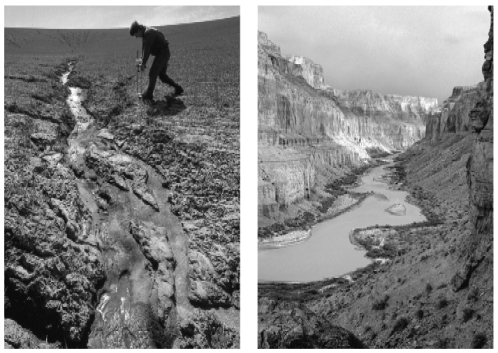 Explain and relate the two geological features shown in the figure above,employing the principle of uniformitarianism put forth by Charles Lyell in 1830.
Explain and relate the two geological features shown in the figure above,employing the principle of uniformitarianism put forth by Charles Lyell in 1830.
Unlock Deck
Unlock for access to all 43 flashcards in this deck.
Unlock Deck
k this deck
24
While various religious leaders challenged almost all of Darwin's major conclusions,
A)all early experimental evolutionists agreed with Darwin.
B)many British scientists embraced Darwin's ideas on evolution.
C)many British scientists rejected Darwin's proposed mechanism of natural selection.
D)B and C
A)all early experimental evolutionists agreed with Darwin.
B)many British scientists embraced Darwin's ideas on evolution.
C)many British scientists rejected Darwin's proposed mechanism of natural selection.
D)B and C

Unlock Deck
Unlock for access to all 43 flashcards in this deck.
Unlock Deck
k this deck
25
Darwin read Lyell's book,Principles of Geology,while serving as ship's naturalist on the HMS Beagle.Describe how Lyell's work influenced Darwin.

Unlock Deck
Unlock for access to all 43 flashcards in this deck.
Unlock Deck
k this deck
26
In the 1880s,experimental work by August Weisman demonstrated that traits acquired during a lifetime could not be inherited.This dealt a deathblow to previous theories of Lamarckian inheritance and left scientists with which of the following possible processes of evolution?
A)Sudden, large changes
C)Saltationism
B)Slow acting natural selection
D)All of the above
A)Sudden, large changes
C)Saltationism
B)Slow acting natural selection
D)All of the above

Unlock Deck
Unlock for access to all 43 flashcards in this deck.
Unlock Deck
k this deck
27
In 1858,Darwin received a manuscript from Wallace in which Wallace proposed a theory very similar to his own.Darwin first presented his ideas in a joint paper with Wallace,which was read to the Linnaean Society,also in 1858.Why do you think history primarily associates Darwin's,not Wallace's,name with the theory of evolution?

Unlock Deck
Unlock for access to all 43 flashcards in this deck.
Unlock Deck
k this deck
28
Darwin drew on the work of Thomas Malthus,a political economist,to convince his readers that
A)there is a competition for limited resources in nature.
B)many individuals in a population do not survive to the age of reproduction.
C)only a fraction of the surviving individuals in a population reproduce.
D)All of the above
A)there is a competition for limited resources in nature.
B)many individuals in a population do not survive to the age of reproduction.
C)only a fraction of the surviving individuals in a population reproduce.
D)All of the above

Unlock Deck
Unlock for access to all 43 flashcards in this deck.
Unlock Deck
k this deck
29
Write a short counter to Paley's argument that as it is virtually impossible for a fully working watch to come into being simply by chance,it is just as impossible for even more complex living creatures to come into being without a fully conscious creator.

Unlock Deck
Unlock for access to all 43 flashcards in this deck.
Unlock Deck
k this deck
30
Darwin's tree of life metaphor
A)linked species in varying degrees of similarity according to their historical pattern of descent.
B)described the branching historical relationships among all living things.
C)applied to both the history and pattern of life's diversity.
D)All of the above
A)linked species in varying degrees of similarity according to their historical pattern of descent.
B)described the branching historical relationships among all living things.
C)applied to both the history and pattern of life's diversity.
D)All of the above

Unlock Deck
Unlock for access to all 43 flashcards in this deck.
Unlock Deck
k this deck
31
The text presents several examples of the belief in spontaneous generation.Why do you think this theory persisted for thousands of years,until Darwin's time,even after the experiments of Francesco Redi?

Unlock Deck
Unlock for access to all 43 flashcards in this deck.
Unlock Deck
k this deck
32
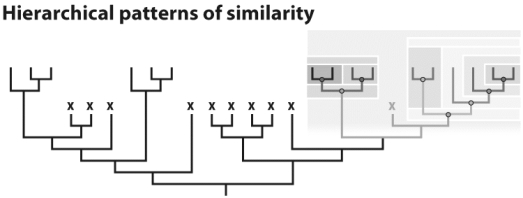 In the figure above,the hierarchically arrayed groups indicated by the shaded grey boxes are called
In the figure above,the hierarchically arrayed groups indicated by the shaded grey boxes are calledA)nodes.
C)species.
B)clades.
D)genera.

Unlock Deck
Unlock for access to all 43 flashcards in this deck.
Unlock Deck
k this deck
33
Both Wallace and Darwin traveled extensively and were struck by the strong patterns they observed in the geographic distribution of nature's diversity.Which of the following observations were made by Wallace?
A)Highly similar species are clustered in time and space.
B)Inheritance is a particulate rather than a blending process.
C)Geographic features seem to play an important role in the clustering of similar, closely related species.
D)A and C
A)Highly similar species are clustered in time and space.
B)Inheritance is a particulate rather than a blending process.
C)Geographic features seem to play an important role in the clustering of similar, closely related species.
D)A and C

Unlock Deck
Unlock for access to all 43 flashcards in this deck.
Unlock Deck
k this deck
34
Explain why the linear hierarchy of Aristotle's scala naturae is incompatible with Darwin's phylogenetic view of biological diversity.

Unlock Deck
Unlock for access to all 43 flashcards in this deck.
Unlock Deck
k this deck
35
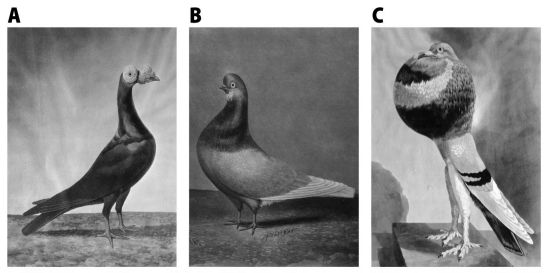 Choose one of the three pigeon varieties from the figure above,and describe what steps breeders may have gone through to produce the unusual characteristics depicted.
Choose one of the three pigeon varieties from the figure above,and describe what steps breeders may have gone through to produce the unusual characteristics depicted.
Unlock Deck
Unlock for access to all 43 flashcards in this deck.
Unlock Deck
k this deck
36
Why was it such a brilliant strategy for Darwin to open On the Origin of Species with a discussion of artificial selection?

Unlock Deck
Unlock for access to all 43 flashcards in this deck.
Unlock Deck
k this deck
37
Darwin faced which of the following major challenges to his theory?
A)Accounting for complex structure with multiple intricate parts
B)Explaining traits and organs of seemingly little importance
C)Understanding why natural selection does not exhaust the genetic variation in a population
D)All of the above
A)Accounting for complex structure with multiple intricate parts
B)Explaining traits and organs of seemingly little importance
C)Understanding why natural selection does not exhaust the genetic variation in a population
D)All of the above

Unlock Deck
Unlock for access to all 43 flashcards in this deck.
Unlock Deck
k this deck
38
The Greek philosopher Empedocles recognized that plant life preceded animal life.Xenophanes (570-470 B.C.)studied fossils in sedimentary rock and concluded that the rocks must have been underwater at one time.Explain why these were important shifts in logical thinking.

Unlock Deck
Unlock for access to all 43 flashcards in this deck.
Unlock Deck
k this deck
39
 The Greek philosopher Anaximander (ca.610-546 B.C.)provided a mechanistic rather than divine explanation of the celestial bodies,as illustrated in the figure above.We now know the details were wrong.Explain why,given the state of knowledge during his lifetime,this was a conception of the universe that made sense and was a breakthrough.
The Greek philosopher Anaximander (ca.610-546 B.C.)provided a mechanistic rather than divine explanation of the celestial bodies,as illustrated in the figure above.We now know the details were wrong.Explain why,given the state of knowledge during his lifetime,this was a conception of the universe that made sense and was a breakthrough.
Unlock Deck
Unlock for access to all 43 flashcards in this deck.
Unlock Deck
k this deck
40
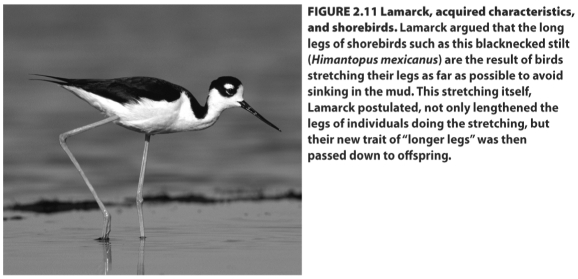 Lamarck's hypothesis of inheritance of acquired characteristics is illustrated and explained in the example of long legged shorebirds in the figure above.Describe your own Lamarckian explanation for another trait that you have observed in a living organism.
Lamarck's hypothesis of inheritance of acquired characteristics is illustrated and explained in the example of long legged shorebirds in the figure above.Describe your own Lamarckian explanation for another trait that you have observed in a living organism.
Unlock Deck
Unlock for access to all 43 flashcards in this deck.
Unlock Deck
k this deck
41
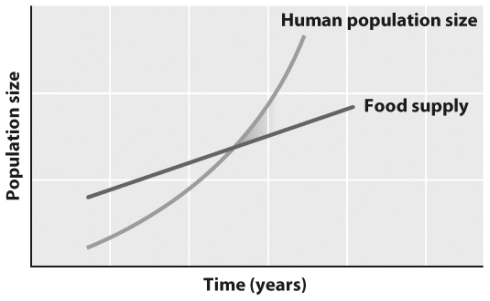 Give an explanation of the English economist Thomas Robert Malthus' argument,presented in the figure above.
Give an explanation of the English economist Thomas Robert Malthus' argument,presented in the figure above.
Unlock Deck
Unlock for access to all 43 flashcards in this deck.
Unlock Deck
k this deck
42
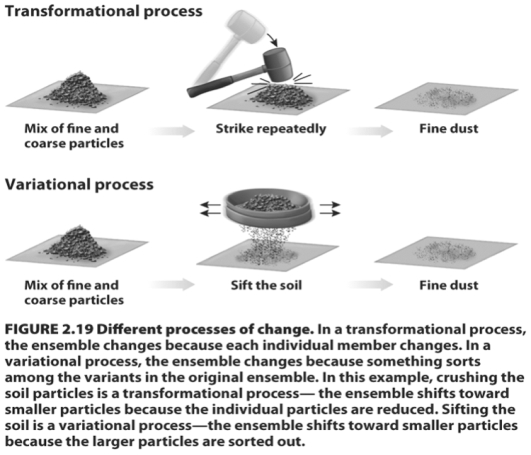 Before Darwin,scientists such as Lamarck envisioned evolutionary change as transformational-properties of an ensemble change because every member of the ensemble changes.Darwin's theory of evolutionary change was,by contrast,a variational one-the properties of an ensemble change because of the action of some sorting process acting on preexisting variation within the ensemble.Referring to the figure above,describe the kind of sorting process that takes place (a)when we use artificial selection to change the characteristics of a breed of animals or plants and (b)when natural selection operates on a population.
Before Darwin,scientists such as Lamarck envisioned evolutionary change as transformational-properties of an ensemble change because every member of the ensemble changes.Darwin's theory of evolutionary change was,by contrast,a variational one-the properties of an ensemble change because of the action of some sorting process acting on preexisting variation within the ensemble.Referring to the figure above,describe the kind of sorting process that takes place (a)when we use artificial selection to change the characteristics of a breed of animals or plants and (b)when natural selection operates on a population.
Unlock Deck
Unlock for access to all 43 flashcards in this deck.
Unlock Deck
k this deck
43
A)
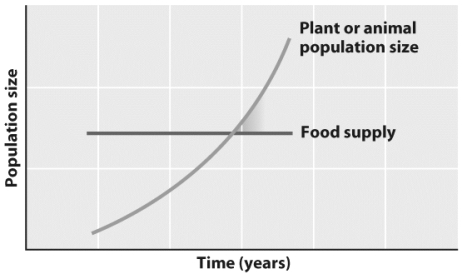 B)
B)
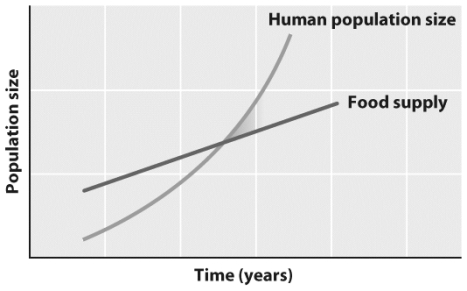 Compare Darwin's adaptation of Malthus' argument to plants and animals in nature (Graph A)with Graph B,representing Malthus' original argument.
Compare Darwin's adaptation of Malthus' argument to plants and animals in nature (Graph A)with Graph B,representing Malthus' original argument.
 B)
B) Compare Darwin's adaptation of Malthus' argument to plants and animals in nature (Graph A)with Graph B,representing Malthus' original argument.
Compare Darwin's adaptation of Malthus' argument to plants and animals in nature (Graph A)with Graph B,representing Malthus' original argument.
Unlock Deck
Unlock for access to all 43 flashcards in this deck.
Unlock Deck
k this deck


